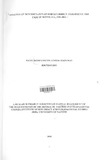| dc.description.abstract | Foreign Direct Investment (FDI) is important to a country for a variety of reasons; it brings investable financial resources, provides new technologies and facilitates access to export markets, thereby strengthening export capability. It also enhances skills and management techniques, the main focus being that foreign investors often require favourable locations to maximize their return for investment. In this analysis of determinants of FDI in Botswana, the thrust of the study is to find the pull and push factors, including the challenges that Botswana faces. Botswana has not been able to attract significant investment in other sectors of the economy other than mining in order to achieve its objective and goal of diversifying the economy and creating sufficient employment opportunities. The determinants of FDI continue to intrigue the academia and policy-makers alike because of the absence of a generally accepted theoretical framework for FDI, compelling researchers to rely on empirical evidence to explain the emergence of FDI. The theoretical literature is choked with many assumptions drawing heavily from theories of imperfect competition and market failure to explain FDI phenomenon. FDI trends emerge more on a consistent manner from the OLI paradigm by J.H Dunning who proposed that FDI can be explained by three categories: namely Ownership (O) for firms to operate abroad, (L) location for advantages to investments in the host country and (I) for benefits of internalization being reasons for firms to undertake FDI. The data collected through the surveys reveal the need for constant revision of the FDI framework in order for a location to remain competitive. This requires countries to offer superior location advantages and adopt investor friendly policies to attract FDI. The study contends that despite having a good investment climate, Botswana is lagging behind in the development of competitive factors and suggests a way forward focusing on; improving competitiveness of the investment climate, attraction of FDI into areas of comparative advantage and the acceleration of local privatization development to boost attraction of FDI into the country. | en_US |



